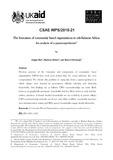The formation of community based organizations in sub-Saharan Africa: An analysis of a quasi-experiment
Abstract
Previous analyses of the formation and composition of community based organizations (CBOs) have used cross section data. So, causal inference has been compromised. We obviate this problem by using data from a quasi-experiment in which villages were formed by government officials selecting and clustering households. Our findings are as follows: CBO co-memberships are more likely between geographically proximate households and less likely between early and late settlers, members of female headed households are not excluded, in poorer villages CBO co-membership networks are denser and, while wealthier households may have been instrumental in setting up CBOs, poorer households engage shortly afterwards.


